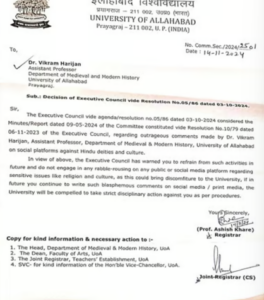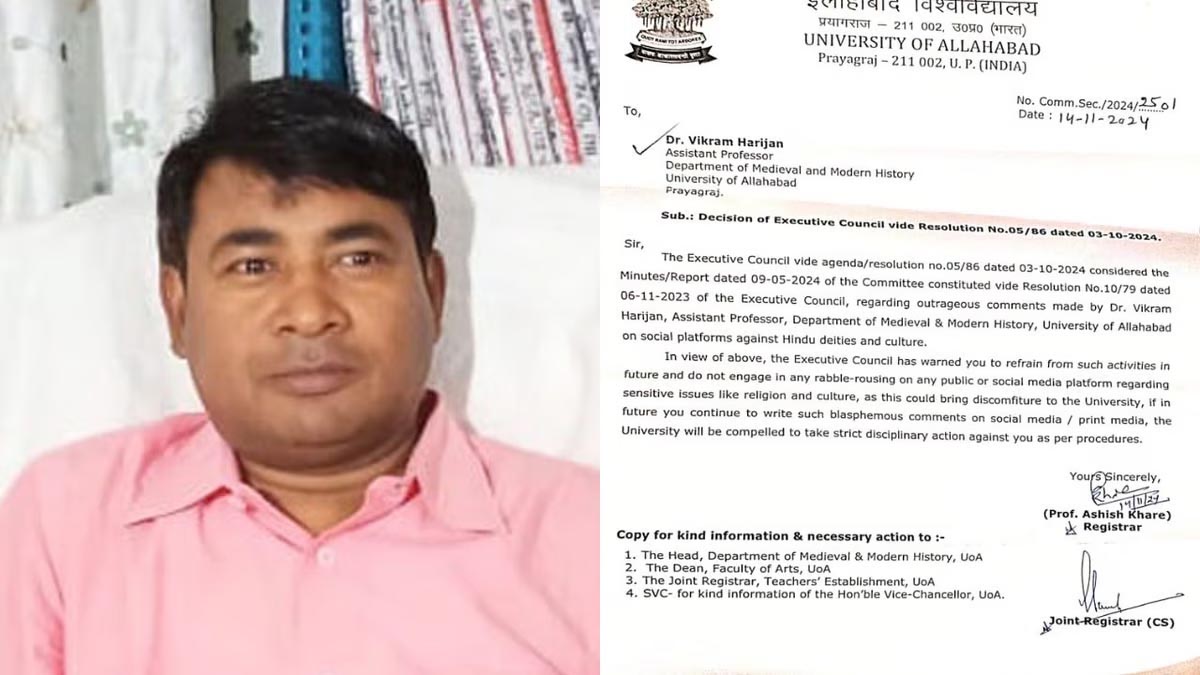In a controversial development at Allahabad University, Prof. Vikram Harijan, an Assistant Professor in the Department of Medieval and Modern History, has been issued a formal notice on November 14, 2024 by the institution following remarks he allegedly made on Hindu deities. The university’s action comes in response to a social media uproar that accused the Dalit academic of offending religious sentiments. Despite the notice, Prof. Harijan has remained steadfast in his views, vowing to continue addressing issues of caste-based discrimination and superstition across all religions.

Background
The controversy surrounding Prof. Harijan began when he posted a critical message on social media, where he voiced concerns over certain Hindu deities, arguing that some religious figures perpetuate caste-based discrimination and superstition. His remarks quickly ignited a firestorm of online criticism, with numerous groups accusing him of insulting Hindu sentiments. The backlash led to widespread condemnation, and the issue escalated further when members of the university’s academic community weighed in.
Though Prof. Harijan issued a public apology for his statements, the response from the public remained largely hostile, prompting the university administration to take formal action. On October 3, during a meeting of the Executive Council of Allahabad University, chaired by Vice-Chancellor Prof. Sangita Srivastava, the council discussed measures to address the situation. In their deliberations, they concluded that any action by university personnel that could tarnish the institution’s image would not be tolerated. As part of this, the council introduced stricter guidelines for all university staff, particularly faculty members. These guidelines included the stipulation that all faculty members must seek prior approval from the Vice-Chancellor before posting content related to the university on social media.
Despite the official apology and efforts to resolve the issue, the matter took a more serious turn on November 14. Registrar Prof. Ashish Khare issued a formal warning to Prof. Harijan. The notice, which was based on the findings and recommendations of the Executive Council, advised the professor to refrain from making any further provocative remarks on sensitive issues like religion and culture. The notice stated that such actions, particularly those made on public or social media platforms, could potentially harm the reputation of Allahabad University. The warning also emphasized that continued behavior of this nature would result in severe disciplinary actions, in line with the institution’s procedural norms.
Prof. Harijan’s unapologetic stance
According to Mooknayak, Prof. Harijan remained unapologetic about his stance on caste-based discrimination and superstition. He emphasized that his critical remarks were directed not at individuals but at the broader social and religious structures that perpetuate inequality and marginalization.
“If religion and caste promote superstition and discrimination, I will speak out against them, and I will continue to do so. Receiving a notice has not deterred me,” Prof. Harijan stated firmly. He clarified that his views were not aimed solely at Hinduism but extended to all religions that, in his opinion, sustain caste hierarchies and exclusionary practices. “I speak against all religions that encourage discrimination, whether it is Hinduism, Islam, or Sikhism. My focus is on marginalized communities who remain excluded across all religious frameworks,” he explained, as reported Mooknayak.
However, Prof. Harijan’s criticism of religious structures is not new. Throughout his academic career, he has been vocal about the intersections of caste, religion, and social justice. His academic work and public remarks challenge the traditional norms that many in India consider sacred. The professor’s unwavering stance on caste discrimination and his refusal to be silenced by university authorities have made him a polarizing figure.
In the aftermath of the notice, Prof. Harijan’s supporters have rallied behind him, lauding his courage to speak out against the social evils of casteism and superstition. Many students and faculty members at Allahabad University have voiced their admiration for Harijan’s commitment to social justice, noting that his contributions to the academic environment have been invaluable in raising awareness about marginalized communities and their struggles.
Allahabad University’s formal notice, and Prof. Harijan’s response, have reignited a larger debate about the freedom of expression, particularly for academics, and the role of universities in shaping public discourse. The incident also raises important questions about the limits of academic freedom, especially when it comes to discussions that challenge deeply held cultural and religious beliefs.
As the situation unfolds, it remains to be seen how the university will balance the need to protect its reputation with the rights of its faculty members to express their academic and personal views. However, one thing is clear: Prof. Harijan’s resolve to address caste discrimination, superstition, and social inequities shows no signs of waning, and his actions will undoubtedly continue to provoke thought and controversy in the academic community and beyond.
Related:
Untouchability and exclusion, absence of voice: Dalit situation 2023
